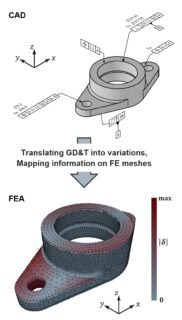Linking Model-Based Definition and Finite Element Analyses for Automated Variation Simulation
Computer-Aided Tolerancing software has become the standard for statistically analyzing the effects of geometrical part variations on product quality. The consideration of physical product behavior requires the solution of differential equations, conducted numerically using Finite Element Analysis (FEA). In a collaboration between KTmfk and the department of Industrial and Materials Science at Chalmers University of Technology, the potential of Model-Based Definition was exploited to examine the link between Computer-Aided Design and FEA programs. The aim is a consistent assessment of the effects of manufacturing variations on non-geometric product characteristics, such as part stress. The developed method uses semantic tolerance information and product geometry, transferred via the Quality Information Framework (QIF), to automatically determine the statistical distributions of geometric and non-geometric product characteristics. This approach extends the functionality of FEA by variation simulation based on sematic tolerance information, enabling a seamless digital assurance of product geometries.
https://doi.org/10.1016/j.cad.2025.104003
